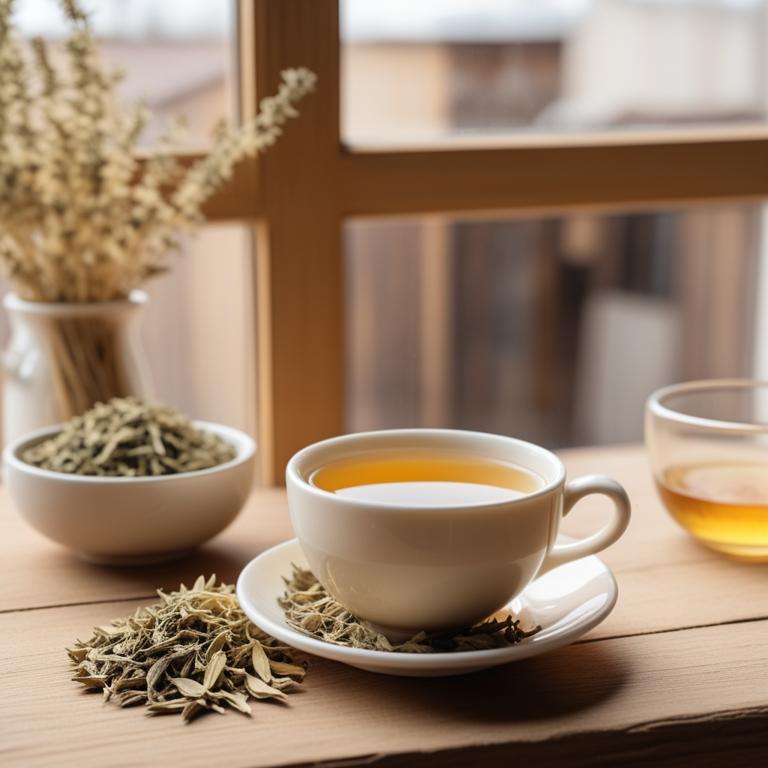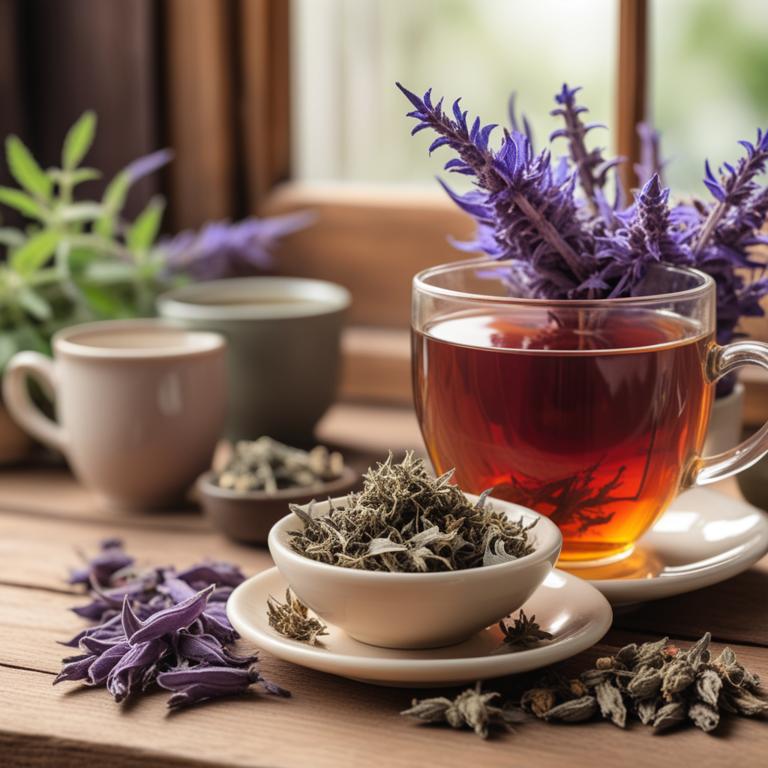10 Herbal Teas For Peripheral Arterial Occlusive Disease

If you're experiencing peripheral arterial occlusive disease, you might find relief in herbal teas.
Peripheral arterial occlusive disease is a condition where blood flow to your legs and feet is reduced, causing pain and discomfort. Herbal teas can help alleviate these symptoms by improving blood flow and reducing inflammation. Ginkgo biloba is an example of an herbal tea that can help. It's known for its ability to improve blood flow and reduce inflammation. Ginkgo biloba tea has been used for centuries to treat various health conditions, including poor circulation. Another herbal tea that can benefit people with peripheral arterial occlusive disease is Panax ginseng.
It's believed to improve blood flow and reduce blood pressure, which can help alleviate symptoms of the condition. Panax ginseng tea has also been known to improve energy levels and reduce fatigue. Zingiber officinale, or ginger, is also a helpful herbal tea for peripheral arterial occlusive disease. It has anti-inflammatory properties that can help reduce pain and discomfort. Ginger tea can also help improve circulation and reduce nausea. Drinking herbal teas like these can bring several benefits to your life. They can help you manage your symptoms, reduce your reliance on medication, and improve your overall quality of life.
By incorporating herbal teas into your daily routine, you may find that you're able to walk further, exercise more, and enjoy activities that you previously found challenging.
- 1. Ginkgo biloba
- 2. Panax ginseng
- 3. Zingiber officinale
- 4. Astragalus membranaceus
- 5. Salvia miltiorrhiza
- 6. Curcuma longa
- 7. Lavandula angustifolia
- 8. Paeonia lactiflora
- 9. Rosmarinus officinalis
- 10. Glycyrrhiza glabra
1. Ginkgo biloba

Ginkgo biloba teas contains flavonoids and terpenoids, including quercetin and bilobalide.
These compounds improve blood flow by opening up blood vessels and preventing platelets from sticking together. This helps to counteract the reduced blood flow associated with peripheral arterial occlusive disease. The flavonoids also reduce inflammation and oxidative stress in the affected blood vessels, which can contribute to disease progression.
By promoting healthy blood flow and reducing inflammation, ginkgo biloba teas may be beneficial for individuals with peripheral arterial occlusive disease.
- Gather 1 cup of boiling water and 1 teaspoon of dried Ginkgo biloba leaves.
- Measure 1 teaspoon of dried Ginkgo biloba leaves and add it to a tea infuser or a heat-resistant cup.
- Pour 1 cup of boiling water over the Ginkgo biloba leaves and let it steep for 5-7 minutes.
- Strain the tea into another cup using the tea infuser or a fine-mesh sieve to remove the Ginkgo biloba leaves.
- Drink the tea 1-2 times a day, ideally 30 minutes after meals, as directed by your healthcare provider.
2. Panax ginseng

Panax ginseng teas contains bioactive constituents like ginsenosides and ginsenolic acids.
These compounds have anti-inflammatory and antioxidant properties that help reduce blood pressure and prevent blood clotting. Ginsenosides specifically have been shown to improve blood flow and lower the risk of peripheral arterial occlusive disease by relaxing blood vessels and reducing the formation of plaque. Additionally, the antioxidant properties of ginsenolic acids help protect against oxidative stress, which can damage blood vessels and worsen the condition.
By reducing inflammation and improving blood flow, Panax ginseng teas may provide relief from the symptoms of peripheral arterial occlusive disease.
- Gather 1 cup of boiling water, 1 tablespoon of dried Panax ginseng root, and a tea infuser or strainer.
- Place the dried Panax ginseng root in the tea infuser or strainer.
- Steep the Panax ginseng root in the boiling water for 5-7 minutes.
- Strain the tea into a cup and discard the ginseng root.
- Drink the tea 1-2 times a day, ideally before meals, to help manage peripheral arterial occlusive disease.
3. Zingiber officinale

Zingiber officinale teas contains bioactive constituents such as gingerol and shogaol, which have anti-inflammatory and antioxidant properties.
These properties help reduce inflammation in the blood vessels and improve circulation, making it beneficial for peripheral arterial occlusive disease. The compounds in Zingiber officinale teas also have vasodilatory effects, which help widen blood vessels and improve blood flow to the affected areas. Furthermore, gingerol and shogaol have been shown to inhibit platelet aggregation, which reduces the risk of blood clots forming in the blood vessels.
By improving circulation and reducing inflammation, Zingiber officinale teas may help alleviate symptoms of peripheral arterial occlusive disease.
- Gather 1 teaspoon of dried Zingiber officinale root, 1 cup of boiling water, and a tea infuser or strainer.
- Place the Zingiber officinale root in the tea infuser or strainer.
- Pour the boiling water over the Zingiber officinale root. Let it steep for 5-7 minutes.
- Strain the tea and discard the Zingiber officinale root. Add honey or lemon to taste, if desired.
- Drink 1-2 cups of the Zingiber officinale tea per day, as directed by your healthcare provider.
Zingiber Officinale Tea on Amazon
FGO Organic Ginger Tea, 100 Count, Eco-Conscious Tea Bags, Caffeine Free, Packaging May Vary (Pack of 1)
Disclaimer: We earn a commission if you click this link and make a purchase at no additional cost to you.
4. Astragalus membranaceus

Astragalus membranaceus teas contains bioactive constituents such as flavonoids, polysaccharides, and saponins.
These compounds have anti-inflammatory and antioxidant properties that help reduce inflammation and oxidative stress in the blood vessels. The flavonoids in Astragalus membranaceus teas also have vasodilatory properties, which can help improve blood flow to the extremities. By reducing inflammation and improving blood flow, Astragalus membranaceus teas may help alleviate symptoms of peripheral arterial occlusive disease, such as pain and cramping in the legs.
The antioxidants in Astragalus membranaceus teas can also help protect the blood vessels from damage caused by free radicals, further contributing to its potential benefits.
- Gather 2 teaspoons of dried Astragalus membranaceus root, 1 cup of boiling water, and a tea infuser or strainer.
- Measure the Astragalus membranaceus root and place it in the tea infuser or strainer.
- Pour the boiling water over the Astragalus membranaceus root and let it steep for 5-7 minutes.
- Strain the tea into a cup and discard the Astragalus membranaceus root.
- Drink the tea 2-3 times a day, as needed, to help manage peripheral arterial occlusive disease.
5. Salvia miltiorrhiza

Salvia miltiorrhiza teas contains active constituents like tanshinones and salvianolic acids.
These compounds have antioxidant and anti-inflammatory properties, which help reduce blood vessel damage and improve blood flow in peripheral arterial occlusive disease. The antioxidant properties of tanshinones and salvianolic acids also help protect against oxidative stress, a key factor in the development of peripheral arterial occlusive disease. Salvianolic acids have been shown to improve blood vessel function by relaxing blood vessels and reducing blood pressure.
By improving blood flow and reducing blood pressure, Salvia miltiorrhiza teas can help alleviate symptoms of peripheral arterial occlusive disease.
- Gather 10 grams of dried Salvia miltiorrhiza roots.
- Measure 1 cup of boiling water and let it cool for 5 minutes.
- Add 1 teaspoon of the dried Salvia miltiorrhiza roots to the cooled water.
- Steep the mixture for 10-15 minutes, then strain the liquid.
- Drink 2-3 cups of the Salvia miltiorrhiza tea per day, 2-3 times a week.
6. Curcuma longa

Curcuma longa teas contains curcumin, demethoxycurcumin, and bisdemethoxycurcumin as its bioactive constituents.
These compounds have potent anti-inflammatory and antioxidant properties, which help reduce inflammation in the blood vessels and prevent the formation of blood clots. The curcuminoids also improve blood flow by increasing the production of nitric oxide, a molecule that relaxes the blood vessel walls and allows for better blood circulation. Additionally, curcuma longa teas contain polyphenols, which have been shown to reduce oxidative stress and improve the function of the endothelium, the inner lining of blood vessels.
Regular consumption of Curcuma longa teas may help alleviate symptoms of peripheral arterial occlusive disease by improving blood flow and reducing inflammation in the affected areas.
- Gather 1 teaspoon of dried Curcuma longa root powder and 1 cup of boiling water.
- Add the powder to the boiling water and stir well.
- Reduce heat to low and let it simmer for 5-7 minutes.
- Strain the liquid into a cup using a tea strainer or a piece of cheesecloth.
- Drink the tea 2-3 times a day for peripheral arterial occlusive disease relief.
7. Lavandula angustifolia

Lavandula angustifolia teas contains bioactive constituents like linalool and linalyl acetate, which have anti-inflammatory properties.
These compounds help reduce inflammation in the blood vessels, making them a potential remedy for peripheral arterial occlusive disease. The vasodilating properties of linalool and linalyl acetate also help to widen blood vessels and improve blood flow, which is essential for reducing the symptoms of this condition. Additionally, Lavandula angustifolia teas contain antioxidants like rosmarinic acid, which help protect the blood vessels from damage and promote overall vascular health.
By reducing inflammation and promoting blood flow, Lavandula angustifolia teas may help alleviate the symptoms of peripheral arterial occlusive disease.
- Get 1 cup of boiling water and a tea infuser or a heat-resistant cup.
- Add 1 tablespoon of dried Lavandula angustifolia flowers to the infuser or cup.
- Steep the flowers in the boiling water for 5-7 minutes.
- Strain the tea into a cup and discard the flowers.
- Drink 1 cup of the tea 2-3 times a day, as needed, and consult with a healthcare professional before using it to treat peripheral arterial occlusive disease.
8. Paeonia lactiflora

Paeonia lactiflora teas contains paeonol and paeoniflorin, two key bioactive constituents that help with peripheral arterial occlusive disease.
Paeonol has anti-inflammatory properties, which reduce swelling and promote blood flow to the affected areas. Paeoniflorin, on the other hand, has vasodilating properties, which help to widen narrowed blood vessels and improve circulation. The combination of these two compounds in Paeonia lactiflora teas makes it a potentially effective treatment for peripheral arterial occlusive disease.
By improving blood flow and reducing inflammation, Paeonia lactiflora teas may help to alleviate symptoms and promote healing.
- Gather 2 teaspoons of dried Paeonia lactiflora root, 1 cup of boiling water, and a heat-resistant cup.
- Add the dried Paeonia lactiflora root to the boiling water, then remove from heat.
- Steep the mixture for 5-7 minutes, then strain the liquid into another cup.
- Add honey or sugar to taste, if needed. The tea should be cooled before consumption.
- Drink 1 cup of the Paeonia lactiflora tea, 2-3 times a day, for relief from peripheral arterial occlusive disease symptoms.
9. Rosmarinus officinalis

Rosmarinus officinalis teas contains essential oils, including carnosic acid, rosmarinic acid, and camphor, which are responsible for its medicinal properties.
Rosmarinus officinalis teas has anti-inflammatory and antioxidant properties, which can help to reduce the inflammation and oxidative stress associated with peripheral arterial occlusive disease. The antioxidant properties of rosmarinic acid can help to protect the blood vessels from damage and promote healthy blood flow. Carnosic acid has been shown to have anti-inflammatory effects, which can help to reduce the inflammation that contributes to the progression of peripheral arterial occlusive disease.
By reducing inflammation and promoting healthy blood flow, Rosmarinus officinalis teas may help to alleviate symptoms of peripheral arterial occlusive disease.
- Gather 1 tablespoon of dried Rosmarinus officinalis leaves and 1 cup of boiling water.
- Steep the dried leaves in the boiling water for 5-7 minutes.
- Strain the tea into a cup and discard the leaves.
- Add 1 tablespoon of honey to the tea, if desired, and stir well.
- Drink the tea 2-3 times a day to help manage peripheral arterial occlusive disease.
10. Glycyrrhiza glabra

Glycyrrhiza glabra teas contains bioactive constituents like glycyrrhizin and flavonoids that help improve circulation and reduce inflammation.
Glycyrrhizin has anti-inflammatory properties that help relax blood vessels and improve blood flow to the extremities. Flavonoids, on the other hand, have antioxidant properties that help protect the blood vessels from damage and promote healthy blood flow. The combination of these properties helps to improve peripheral circulation, reducing the symptoms of peripheral arterial occlusive disease such as pain, cramping, and fatigue in the legs.
Regular consumption of Glycyrrhiza glabra teas may help improve the symptoms of peripheral arterial occlusive disease, making it a potential natural remedy for this condition.
- Gather 1 cup of dried Glycyrrhiza glabra roots and 2 cups of water.
- Cut the dried roots into small pieces and put them in a saucepan.
- Boil 2 cups of water in the saucepan and add the dried root pieces. Reduce heat and let simmer for 10 minutes.
- Strain the liquid into a cup using a fine-mesh sieve or cheesecloth. Discard the solids.
- Drink 1/2 cup of the tea 2-3 times a day, as needed.